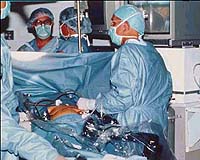 |
Washington DC (SPX) Jan 07, 2011 Two doses of the varicella, or chickenpox, vaccine provide excellent protection in children against this highly contagious and, in some cases, severe disease. To be published in the February 1 issue of The Journal of Infectious Diseases, the findings support the two-dose vaccine regimen recommended in the United States since 2006. (Please see below for a link to the study online.) The Centers for Disease Control and Prevention (CDC) began recommending a single dose of varicella vaccine in children aged 1 to 13 years old in 1995. Although the incidence of varicella fell by 90 percent after introduction of the vaccine, there was a high rate of breakthrough varicella illness in immunized children and continuing outbreaks of varicella among children despite high rates of vaccination. Studies also showed that the single-dose vaccine's effectiveness was less than 90 percent. Given the evidence, CDC in 2006 began recommending a second dose of the vaccine for children 4 to 6 years old. Although data suggest that two doses of varicella vaccine are associated with higher levels of antibody than is one dose, this study is the first to assess the clinical effectiveness of two doses of the vaccine in the general population. Eugene D. Shapiro, MD, and colleagues at Yale University and collaborators at Columbia University conducted active surveillance in an area in Connecticut and discovered 71 cases of varicella in children aged 4 or older. None of the children had received two doses of vaccine, 66 (93 percent) had received one dose, and 5 (7 percent) had received no vaccine. The investigators then compared the effectiveness of two doses of vaccine versus one dose in a case-control study, using 140 matched controls. The effectiveness of one dose in preventing varicella was 86.0 percent, while the effectiveness of two doses was 98.3 percent. According to Dr. Shapiro, "The odds of developing varicella were 95 percent lower in children who had received two doses of the vaccine compared with those who had received only one." The results of this study suggest that countries immunizing children with only one dose of varicella vaccine should consider changing to a two-dose regimen. But, the authors emphasized, "There should be continued monitoring of the effectiveness of two doses to assure that its high degree of effectiveness is sustained." In an accompanying editorial, David W. Kimberlin, MD, of the University of Alabama at Birmingham, agreed with the study authors, noting that this study is the first to evaluate the effectiveness of two doses of varicella vaccine in a "real-world" setting. "The high effectiveness of 98.3 percent found in this investigation supports the programmatic change instituted four years ago," Dr. Kimberlin noted. 1/ "Effectiveness of 2 Doses of Varicella Vaccine in Children" 2/ "Control of Varicella Disease, Version 2.0"
Share This Article With Planet Earth
Related Links Infectious Diseases Society of America Hospital and Medical News at InternDaily.com
 Doctors Should Be Required To Disclose Sleep Deprived Status
Doctors Should Be Required To Disclose Sleep Deprived StatusWashington DC (SPX) Jan 04, 2011 While regulations have been put in place to restrict the work hours of doctors in training, no such regulations exist for fully trained physicians. An editorial in the New England Journal of Medicine argues that sleep-deprived physicians should not be permitted to proceed with an elective surgery without a patient's informed, written consent. According to the authors, "This approach would ... read more |
|
| The content herein, unless otherwise known to be public domain, are Copyright 1995-2010 - SpaceDaily. AFP and UPI Wire Stories are copyright Agence France-Presse and United Press International. ESA Portal Reports are copyright European Space Agency. All NASA sourced material is public domain. Additional copyrights may apply in whole or part to other bona fide parties. Advertising does not imply endorsement,agreement or approval of any opinions, statements or information provided by SpaceDaily on any Web page published or hosted by SpaceDaily. Privacy Statement |